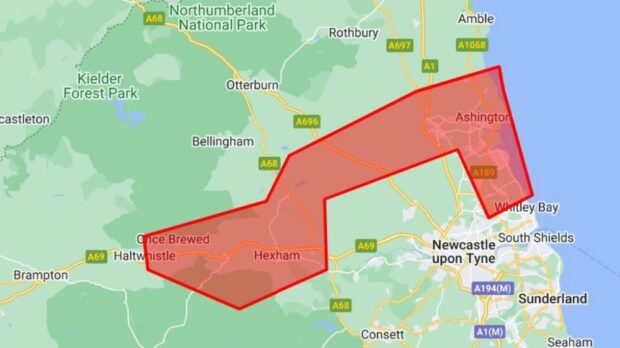Flight restrictions to allow drones to transport supplies between hospitals is a “massive airspace grab” that will ground other aircraft, it is claimed.
Apian Ltd secured a temporary danger area (TDA) airspace closure for a drone trial between February and May and is applying for it to continue.
But opponents say it extends far wider and higher than necessary. Apian said it was involved in a “formal engagement process on airspace changes” and no decision had been made.
A spokesperson said it wanted to “engage with as many individuals and groups as possible to hear their feedback and take it on board wherever we can”.
The Civil Aviation Authority, which will decide whether to approve the TDA, said it did not comment on specific airspace change proposals.
Pilots and airstrip owners say the TDA effectively closes two grass airstrips in Northumberland which are used by light aircraft, microlight associations and historic aircraft. The operator of the Stanton airfield near Morpeth, who asked not to be named, said it would cause a “substantial loss of income” to his family’s farm.
“It’s a small farm, it has to diversify to survive, and that’s one of our main sources of diversification,” he said.
“The whole thing is a massive airspace grab and is obviously going to affect a lot of pilots and put our airstrip out of action,” he said.
Pilots say the TDA blocks air transit from north to south and from the east of the country to the coast. They also say forcing historic aircraft or microlight users to fly over the sea to avoid the TDA is unsafe.
They add that drones can safely fly at low altitude along a narrow corridor so stopping other aircraft flying entirely was not necessary.
Apian said it was “working in collaboration with the CAA to support the development of integrated airspace that allows safe, equitable use for all airspace users”.
It said it was “not our intention” to close airstrips and hoped to find a solution to allow both operations to “safely co-exist”.
The flying community has also complained that Apian was awarded more than £799,000 of public money to run the trial.
They argue the limitations of drones mean other carbon neutral options are better value for money and point out NHS supply transport on the ground still had to run during the earlier trial.
Innovate UK, which oversees SBRI Healthcare which awarded the money, said it was aimed at helping “improve patient care and save money while also making the NHS greener”.
A spokesperson said funding decisions were made by “a rigorous process by experts”.
The operator of the Stanton airstrip said the concern in the community was that Apian could use the trial as proof of concept without spending its own money and then sell the service to commercial operations like Amazon.
In response, Apian said it did not own or operate the drones but was a “healthcare logistics” company that was “attempting to prove that on-demand delivery improves patient health outcomes and staff wellbeing”.
The company, which was founded by former NHS doctors, was “born from the NHS focused on the NHS”, it said.
Pilots say they are not opposed to drones in general but believe NHS usage will only be viable when technology exists to allow them to operate alongside other aircraft without the need to block off large areas of airspace.
Similar trials have also been carried out in Hampshire and the Isle of Wight, Lancashire and Cumbria, and Essex.
Source: BBC

